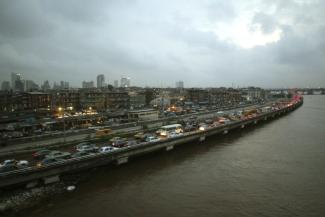Urban traffic
Making traffic flow again

To keep Lagos moving Governor Akinwunmi Ambode, has commissioned 434 new air-conditioned buses for the rapid transit system on the most-used traffic arterials. A water transport scheme is in the pipeline. Moreover, new funding has been allocated to an ongoing light-rail project, which is assisted by the Word Bank. The goal is to make it operational by the end of this year. The light rail will decongest one of the agglomeration’s main commuter routes.
According to official records, 751 people were involved in 112 road traffic accidents in the first three months of this year. The aim is to reduce road traffic accidents by 15 % and deaths by 25 %. The safety of pedestrians as well as car passengers depends on the quality of roads. All too often, pedestrian bridges are forgotten in traffic planning and road construction. In the Lagos agglomeration, many new pedestrian bridges have been built in the past year over key highways.
Another very important infrastructure project is the Forth Mainland Bridge. It will connect Lagos Island to the mainland. The three existing bridges tend to be congested due to massive commuter traffic. Governor Ambode has signed a memorandum of understanding for the bridge, which will be designed by the Nigerian architect Kunlé Adeyemi. Its lower level will provide space for pedestrians as well as for social, cultural and commercial interactions.
The state government has introduced what it calls “mobile courts”. Members of the judiciary ride black vans on the streets of Lagos and deal with the infringement of traffic rules, such as illegally using the lanes reserved for bus rapid transit or operating busses with open doors. In the past, officers of the Lagos State Traffic Management Authority (LASTMA) dealt with these matters, and they had a reputation of harassing drivers. LASTMA has been restructured for more efficient traffic control, and judicial matters are now handled by the mobile courts.










